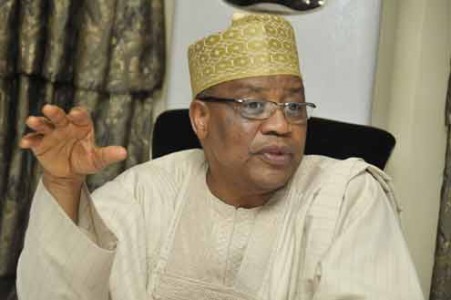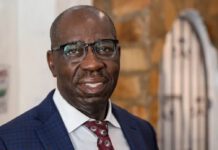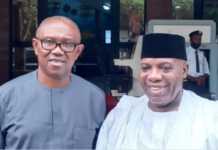 Former military president, General Ibrahim Badamasi Babangida (retd), has kicked against the use of soldiers for electoral duties, saying it would expose them to compromise, even as he advised against negotiating with Boko Haram because they have so far refused to ‘identify themselves’.
Former military president, General Ibrahim Badamasi Babangida (retd), has kicked against the use of soldiers for electoral duties, saying it would expose them to compromise, even as he advised against negotiating with Boko Haram because they have so far refused to ‘identify themselves’.
IBB, who spoke to correspondents at his hilltop mansion in Minna, Niger State, as part of activities to mark his 73rd birthday on Sunday, said that if the police were well equipped and trained, they would be able to exercise the civic duty of providing security cover for elections.
He recalled that when he was an officer in the ‘6os, there was never a time that they were drafted for such civic duty and the police then was able to manage the situation.
According to Babangida, if the military must be drafted for the 2015 election, it should be to transport sensitive election materials to difficult terrains like the creeks and not the streets, where the police can easily provide security with proper training and equipment.
The former military leader said: “The militarization of the polity is your fault simply because, somehow, there is this element in you; you seem to accept that, whether consciously or unconsciously, you have compromised your Police Force. So the last one that has not been compromised but that would soon be compromised is the military.
“But I don’t believe that the military should supervise the elections because I don’t believe it should participate. A peep into the Nigeria Police Force, which is the closest to the people, is if the government is able to train them, they would be able to handle any situation”.
IBB added: “I was already an officer in the Nigerian Army in the ‘60s and there was no military presence in those days except the Nigeria Police, and I think it is high time we restored the past glory of the force. But I think it is again what the developing countries face; the time would come — though I am not sure of the military guys to be involved in these civil duties. It cannot continue like this; you guys would shout your heads out; the public would shout and the administration would listen”.
On whether the military should be involved in 2015, IBB said: “I tell you that, up till date, there are places that you need logistical support by the political leaders. If you take, for example, there are boats in the creeks of the Niger Delta region. The boats have the access to the remote villages and townships in that region, not the road during the elections or whatever it is.
“So, I can see a government that would say, okay, if you go to villages in the creeks and we have boats that can get in there, you can ask those people operating the boats to use their boats in ferrying ballot boxes to such places that cannot be easily accessed through the roads and that is perfectly okay. But pertinently I don’t believe the military guys should be seen in the streets during election”.
On Boko Haram he said that it is very difficult for government to fight and negotiate with them because “you go into negotiations with the people you know and people whom you can identify, but in the case of the Boko Haram sect, whom do you negotiate with?”
“That is the problem. I do not believe that the federal government or Mr President should throw open his doors to continue to negotiate with people who have gone into hiding and have not identified themselves; so whom do you talk with?” he asked.
“You can only negotiate with identified persons who, for one reason or the other, everybody knows them and that they are fighting for a particular cause by saying this is what they are doing, and I think that is fair enough. But we don’t know these guys; so we have to be fair to the federal government about this conflict. Let them come out and say this is the leadership, this is the structure, these are our grievances; this is what we want and then they can sit down and talk. But so far it has not happened”.
On the aim of the group, he explained: “If you have an insurgence, let’s get one thing correct: the insurgents know one thing: they don’t have the strength, they don’t have the power to confront a regular army; that is why they involve themselves in bombing, suicide bombing. The whole purpose is to strike fear in the minds of the public to such an extent that if it continues the people will begin to doubt the capability of government to protect their lives and properties”.
While saying that the military needed the support of all and sundry to combat the Boko Haram insurgency, the former Nigerian ruler said it would be counterproductive if the military forcefully went into Sambisa forest and the lives of the Chibok girls abducted were lost in the process.
“I am aware of what the government is doing now and I know that there are a lot of complications. It is no longer an issue that you could ask the military to move inside Sambisa forest and release these young girls. I think what Nigerians want is that they want them released and come home alive, but not dead and not through anything, but they want them alive. And this is a very genuine thinking. From my experience as a professional soldier, we need a lot of planning; a lot of cooperation; a lot of studies has to be done to achieve this objective”, he stated.
He continued: “Either 217 or 219, or whatever the number is, is a lot of population to lose just like that. But I think the government is trying from what we got during our last briefing and I am quite satisfied that efforts were being made to get them released. You see, the objective is to get them out of that place alive, because the operative word is alive; if we enforce any military operation, we can get them all killed . So, the objective could be defeated”.




